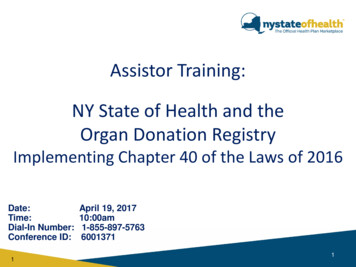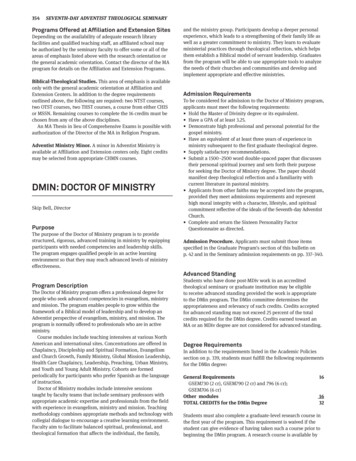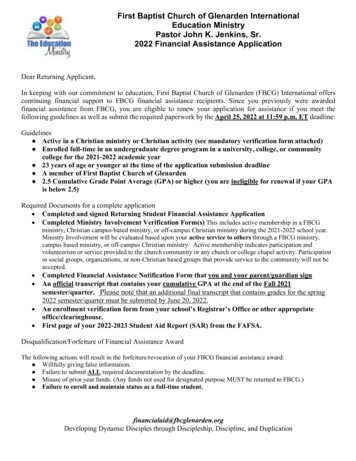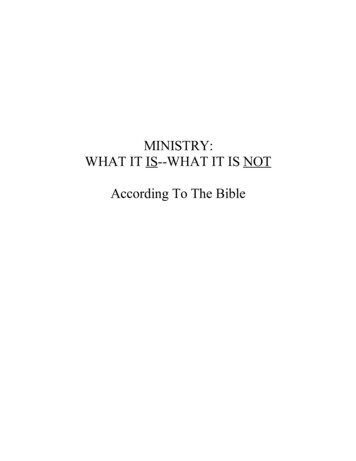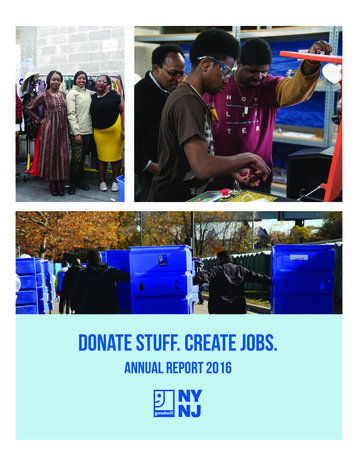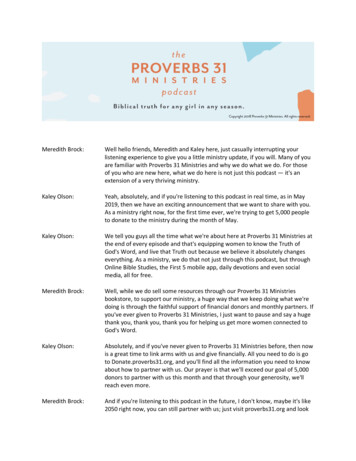
Transcription
Meredith Brock:Well hello friends, Meredith and Kaley here, just casually interrupting yourlistening experience to give you a little ministry update, if you will. Many of youare familiar with Proverbs 31 Ministries and why we do what we do. For thoseof you who are new here, what we do here is not just this podcast — it's anextension of a very thriving ministry.Kaley Olson:Yeah, absolutely, and if you're listening to this podcast in real time, as in May2019, then we have an exciting announcement that we want to share with you.As a ministry right now, for the first time ever, we're trying to get 5,000 peopleto donate to the ministry during the month of May.Kaley Olson:We tell you guys all the time what we're about here at Proverbs 31 Ministries atthe end of every episode and that's equipping women to know the Truth ofGod's Word, and live that Truth out because we believe it absolutely changeseverything. As a ministry, we do that not just through this podcast, but throughOnline Bible Studies, the First 5 mobile app, daily devotions and even socialmedia, all for free.Meredith Brock:Well, while we do sell some resources through our Proverbs 31 Ministriesbookstore, to support our ministry, a huge way that we keep doing what we'redoing is through the faithful support of financial donors and monthly partners. Ifyou've ever given to Proverbs 31 Ministries, I just want to pause and say a hugethank you, thank you, thank you for helping us get more women connected toGod's Word.Kaley Olson:Absolutely, and if you've never given to Proverbs 31 Ministries before, then nowis a great time to link arms with us and give financially. All you need to do is goto Donate.proverbs31.org, and you'll find all the information you need to knowabout how to partner with us. Our prayer is that we'll exceed our goal of 5,000donors to partner with us this month and that through your generosity, we'llreach even more.Meredith Brock:And if you're listening to this podcast in the future, I don't know, maybe it's like2050 right now, you can still partner with us; just visit proverbs31.org and look
for the Donate button on the website, and you'll find everything you need toknow to help support Proverbs 31 Ministries.Meredith Brock:All right, all right, I think they've heard enough of us; let’s get them back totoday's teaching. Here is the podcast.Kaley Olson:Hello friends, welcome back to The Proverbs 31 Ministries Podcast where weshare biblical Truth for any girl in any season. I'm your host, Kaley Olson, and I'mhere with my friend and co-host, Meredith Brock.Meredith Brock:Well hey Kaley, so glad to be back with you today. It's been a hot minute sincewe've recorded just a regular episode of the podcast, so I'm excited to be backhere, even though, holy cow, can we pause for a moment and talk aboutTherapy and Theology?Kaley Olson:Wow, what a series.Meredith Brock:What a series. We heard a tremendous amount of positive feedback, just peoplebeing exposed to things in a safe environment that was biblically based to talkabout things that a lot of people are afraid to talk about.Kaley Olson:Yeah, I definitely think it was not think, I don't think it was, I know it was one of the deeper podcasts we've done and we just haven't ever gone there as aministry before, and I feel like Lysa's book releasing and then our Online BibleStudy for It’s Not Supposed to Be This Way, had what, 128,000 womenparticipate, so I feel like we were like, yeah, it's insane, like imagine 128,000 ofyour closest friends sitting together. There's not even a football stadium thatfills up-Meredith Brock:That's bananas.Kaley Olson:I don't think there is.Meredith Brock:That is bananas.Kaley Olson:Somebody's probably fact checking me right now.Meredith Brock:Probably.Kaley Olson:Oh well.Meredith Brock:I encourage that.Kaley Olson:Just let me know, let me know.
Meredith Brock:Well, I'm excited to be back today. We've got a great teaching ahead of us, butbefore I do that, before we get into that, I want to talk about what we did lastnight.Kaley Olson:What did we do last night? It sounds like we went out.Meredith Brock:But we didn't.Kaley Olson:No, we didn't, we stayed in.Meredith Brock:We stayed in with our friends-Kaley Olson:From our team.Meredith Brock:. and played Codenames.Kaley Olson:We did.Meredith Brock:I want to know somebody in the social media sphere, tell me if they've playedCodenames — it might be the most fun game I've played in a really long time. Ilove it.Kaley Olson:Yeah, I think it's equally fun and frustrating because I have this thought patternin my mind of the words that I'm connecting together, and I just feel like it's soobviously clear, and Meredith is like, no, no, no I know how Kaley thinks, Kaleywould never do that. In my mind, I'm dying because I'm like, yes I would, yes Iwould. Pick the names, [crosstalk 00:04:23], and we lost.Meredith Brock:So if y'all are looking for a good game to play with your family, play with yourfriends, go out and get Codesnames, and then hit us up on social media and tellus if you had fun playing it, because we had so much fun playing it with ourfriends — it was awesome.Kaley Olson:We did.Meredith Brock:It was really, really, awesome.Kaley Olson:Okay, I think we've talked about Codenames enough; maybe we should get backto the podcast now.Meredith Brock:Okay.Kaley Olson:That's our job. But, I'm really excited about our teacher that we have today.Many of our listeners are probably familiar with his voice now because they justlistened to six weeks of him in the Therapy and Theology series, welcome back,Joel Muddamalle. So glad to have you here with us today. Joel, why don't youtell us what you do for Proverbs 31.
Joel Muddamalle:Yeah, I get to serve as a Director of Theology for the ministry and get to bringsome oversight to some of the theological development and to the writing andjust the biblical content I guess that we write and that we share from. So, Iliterally get to study the Bible and study teaching and study Scripture andnavigate all of those worlds. It's fun.Meredith Brock:Well, we're sure glad to have you here on staff. I'm also glad that Kaley had tosay your last name because I have worked with you for how long, and I still can'tsay it.Joel Muddamalle:A long time.Meredith Brock:And I can't say it to save my life; I can't say your last name.Joel Muddamalle:Yeah, just go and give it a try.Meredith Brock:I can't. I'm embarrassed to do it.Kaley Olson:Muddamalle.Meredith Brock:Muddamalle.Kaley Olson:There you go, you got it.Meredith Brock:If you would not have said that beforehand, I'm certain that I would've said, Idon't know. It just always comes out wrong. But y'all, okay you need to spell it.Spell it for everyone.Joel Muddamalle:Okay, so it's M-U-D-D-A-M-A-L-L-E.Meredith Brock:Whoa, that's a lot of double letters.Joel Muddamalle:It is.Meredith Brock:It's a whole lot, but I encourage you to go and find Joel on Instagram because heposts some of the . I love it, I love the stuff that you post in your storiesbecause he'll show what he's studying, and then he kind of unpacks it in littlebite-size pieces that just in the middle of the day is really, I don't know, I justreally, really, love it.Meredith Brock:He spelled his last name for you. Go find him on the ‘gram.Kaley Olson:I think it's just @Muddamalle.Meredith Brock:Yeah.Kaley Olson:I mean, if you're-
Meredith Brock:You made that sound really simple.Kaley Olson:Thanks.Joel Muddamalle:She's showing off now.Meredith Brock:Yeah, I know right. Well, we're sure glad to have you here.Joel Muddamalle:Yeah.Meredith Brock:Yeah, it's going to be a great teaching.Kaley Olson:Yeah, thanks for taking a break from your regularly scheduled Starbucks studyappointments and being with us today.Joel Muddamalle:I was waiting for that.Kaley Olson:Oh, we were talking about before the podcast started that Joel has a regularlyscheduled membership — I feel like if Starbucks had memberships, Joel wouldbe a member because there's this thing that we have on staff where if you go tothat Starbucks and you find Joel, you do one of those Instagram zoom in things,and we found Joel in the wild. Here he is. Here he is.Kaley Olson:But anyway, he took a break from his studying, and we're so glad you did. Thankyou for being here with us today, first of all I know that this is a really bigcommitment for you. But, he's going to teach on the topic of fasting, which I'mreally excited about, but not just fasting but on why we should fast. So, I'mactually really excited about this because even though I grew up a believer, Iwent to a really traditional Southern Baptist church. I don't remember hearing alot about fasting that we talked about from either at my home or in church andit might be because I wasn't paying attention because maybe I was little, but Ialso just don't know that it was something that was just regularly talked about.Kaley Olson:So I'm really excited because it's only been since college that I really started tolearn more about it, and so Joel, I'm just so thankful for the way that you takethese concepts that can kind of seem weird or tricky and unpack them in a waythat makes it, I don't know, just relatable to me. I can't wait to hear what youhave to share with us today. If you want to go ahead and give your teaching.Joel Muddamalle:Well I am super excited. So here's the funny thing, I literally came here fromthat Starbucks and so-Meredith Brock:Of course you did.Kaley Olson:I knew it.
Joel Muddamalle:Yeah, yeah and so the chances are of you seeing some type of Instagram ofsomebody catching me in the Starbucks wild is very high. But, one of the thingsKaley, when you had actually emailed me and said, hey I think this fasting thingmight be an interesting topic to consider, it really got me going personally,because I don't know if you guys have ever done this, but whenever a wordcomes up, sometimes your brain goes back to, well how do I personallyassociate with this word in my life or in my story?Joel Muddamalle:So, if you guys could see me right now, I'm Indian, like from India, and it's notsuper common to find Indians that are Christians, I mean, in India thepopulation of Christianity is like less than a percent or something like that; it'spretty insane. So I grew up in a Christian family and maybe similar to some ofyour guys' experiences I heard about fasting a lot. Even partook of it, and kind ofdid it with my family. But in all honesty, and I think you mentioned it Kaley, Iwasn't quite sure why I was doing this.Joel Muddamalle:Again, so for me, the thought of being hangry is not a great thought. There'snothing inside of me that says, hmm, I think I'm just going to stop eating for awhile. So, I wanted to start by maybe going behind fasting and first talk aboutwell, what is fasting and how does it relate to the other parts of our spirituallife? So, really fasting, it starts with just one part of a larger category calledspiritual disciplines.Joel Muddamalle:So, what are our spiritual disciplines? Well, our spiritual disciplines are tieddirectly to this idea of spiritual formation. So if you've been in the Christianworld for some time or a believer, and you've done Bible studies and differentthings, these words probably have some type of meaning to you. But you mightbe a brand-new believer and you might have just come to know Jesus andyou're like, what is a spiritual discipline and why would I want to be spirituallytransformed?Joel Muddamalle:So the idea of spiritual formation is really this idea of becoming more like Jesus.That's really the journey that I think we're all on. We love Jesus. We arecaptivated by who He is and what He's done and so we want to be like Him.Then spiritual disciplines are almost like the strategy or the tactics. Like, okay,let's get into the grind, and now what can we do to exercise the process ofbecoming more and more like Jesus?Joel Muddamalle:In the list of categories as you read through Scripture, you may see things thatare categorized as spiritual disciplines as prayer. Prayer is simply just talking toGod. Reading Scripture, God's Word is a gracious gift that was given to us and sowhen we read Scripture we're actually engaging in the spiritual discipline ofgetting to know God through His Word.Joel Muddamalle:Here's another one. Caring for others. Generosity. Hospitality. Just being kind.Those types of things are actually fostering in us this relationship to Jesusbecause Jesus was kind. He cared for us, He loved us, and He loved others.Here's another one. Evangelism. Sharing the good news. If you're passionate
about something, you don't keep it hidden. It's not going to take long for youwhen we hang out to find out that I really, really love Chicago-style deep dishpizza. I really love Michael Jordan. Michael Jordan is the greatest of all time,over Lebron James.Joel Muddamalle:I had to say that Meredith's husband [crosstalk 00:11:59], I actually just taggedhim the other day about the . Anyways, just trust me on these. See, it exudesoutside of me, what you're passionate about. And you guys could probably saydifferent things of things that you're passionate about. But that's what happenswhen we love Jesus and we're passionate about Him.Joel Muddamalle:Here're a couple other ones. Silence and solitude. We see often in Scripture thisidea of going away to silent places to spend time with God. Jesus Himself goesinto solitary places in silence to spend time with the Father. Often for us today,this can be done in connection with things like prayer and reading Scripture.And here's the one that's very often tied to prayer: fasting.Joel Muddamalle:Prayer and fasting often go hand-in-hand. Fasting is such an intriguing aspect ofthe spiritual disciplines and I really want to jump into right here, like why wouldwe want to go through the process of engaging with any of these disciplines,specifically fasting? When we do these things, we get closer to Jesus. When wedo these things, we look more like Jesus, and right now I have no idea what yoursituation or your circumstances might have been. I don't know if you're listeningin a podcast, in traffic and you're waiting. You may be experiencing the chaos ofthe world.Joel Muddamalle:Here's what I love about the spiritual disciplines and here's what I love aboutfasting. When we engage in these things, we can mute the chaos as we meetwith the Creator. We can mute the chaos as we meet with the Creator. That isthe lifelong journey that we are on until Jesus comes back or we see Him on theother side of eternity.Joel Muddamalle:Now, what is fasting? Fasting is typically, in the Old Testament, the absence of— or stopping of, doing of — something, typically food. It's saying I'm going totake a puritive time to no longer eat this type of food or engage in this type ofactivity, and so I know many of you are thinking right now how we started.There is no way I would naturally be inclined to want to even do this. And someof you theologians might be saying, wait a minute, Joel, I've got freedom inChrist, and if I've got freedom in Christ, why should I have to give up anything?I'm free to do whatever I want.Joel Muddamalle:This I where we kind of need to see how fasting is used throughout the OldTestament and the New Testament. So, we're going to do a little bit of biblicalwork here, so if you've got your Bibles, you're taking notes or whatever, you cancome back and replay this, here's some interesting aspects about fasting.Fasting in the Old and New Testament can be used as both a noun and verb inhow it's described.
Joel Muddamalle:It's mentioned in the Old Testament together over 34 times. Now, theseinstances are connected to these types of things. Celebrations, or observations,of feasts or things like the day of atonement. Fasting was connected to thesemonumental moments in the life of the Israelites. They just went hand-in-hand.Fasting was also done in response to repentance and confession. Things didn'tgo your way, and you feel a conviction of what has taken place, well, in the OldTestament people would fast as a visible sign of their repentance.Joel Muddamalle:The book of Jonah, Jonah Chapter 3 verses 4 through 9, there's a great example.You would fast in response to mourning. Both Job and David respond by fastingin their response of death, and they mourned a loss of a child or loved ones.Here's an interesting one: in anticipation of hope and victory.Joel Muddamalle:So, often the Israelites, as they're getting ready to fight against the Philistines,they would actually embark on a fast, and what they would do is they wouldanticipate the victory that they knew God was going to do. You could turn to 1Samuel 7:6 and see that. They would also fast prior to major decisions that hadto be made. So, they're going into something, particularly kings. There was ahuge decision that had to be made, well, their tendency was to fast and to prayand to seek the Lord.Joel Muddamalle:Now in the New Testament, because we want to see this holistically, in the NewTestament, both noun and verb show up over 28 times. You can see passages,like all throughout the book of Acts, you see fasting with people laying on ofhands and commissioning in all these different things. When people are sent outto church plant, and you see a tradition of fasting in early church fathers. So,origin and Polycarp, these ancient guys that talked about the Bible back in theday, they would talk about fasting because it's really important.Joel Muddamalle:Here's what's super interesting in all of this. Once we get to the New Testament,fasting is never mandated. I'm going to say that one more time: fasting is nevermandated, like you must do a fast on this time at this point in this week of thismonth, consecutively. What actually takes place here, is fasting is assumed as apractice that believers would do because it draws you closer to Jesus. It causesyou to go through this process of looking more like Christ.Joel Muddamalle:This is where I just feel like we need to pause, and I just want to talk about beingcharitable. What does that mean? It means, different people have differentconvictions at different times, and this is what I love about Scripture. What theNew Testament does for us, is it opens up this thing like fasting, and it saysfasting isn't a close-handed convictional thing that if you don't do this, you'regoing to go to hell. Or you're sinning against God. It's also not something thatyou just ignore completely. There's plenty of biblical significance for it.Joel Muddamalle:What that means is that we have to be charitable to each other so that we canallow the Holy Spirit to bring conviction into our lives, so we navigate spiritualtransformation. It looks different for different people. I want to encourage you,as you're going through your process of just navigating what does fasting look
like for my spiritual life, be charitable with your loved ones and others and don'tassume or expect that your fasting has to look like their fasting. That's going toset up everybody for disappointment.Joel Muddamalle:Now, how do I know, you're probably sitting there thinking, like really, how doyou know that this is kind of assumed in the New Testament. Well, it's a reallyinteresting thing, that Jesus Himself actually described the importance offasting. So if you've got your Bibles, in Matthew 6:16, you can go there, I'mturning right over there right now. Jesus begins to talk about fasting and noticethis, it says this, "and when you fast," so I'm going to pause, what does it say?When you fast.Joel Muddamalle:Jesus is looking at His disciples and He's getting ready to teach them, and He'smaking the assumption that fasting is going to be a part of your natural rhythmof life. But notice, Jesus doesn't say the who, what, when, where, or why behindthe fasting, He's just making that assumption like, I know you're going to fastand again, the charitability component here, I just want to read what Jesus'word are, "and when you fast do not look gloomy like the hypocrite, for theydisfigure their faces" He's talking about like, if you got to the theater, have youall ever gone to the theater?Kaley Olson:Like, movie theater?Joel Muddamalle:No, no, opera, play, I would say like Wicked, think Hamilton, different things likethat.Kaley Olson:[crosstalk 00:19:39] Yes.Joel Muddamalle:So, when you go there, and you see them, do you notice their makeup? Whatdo they look like?Kaley Olson:They're done up. They got some stuff on.Joel Muddamalle:Right, I think it's kind of interesting they have to look that way because of theway the lights kind of hit them and it's offset by the darkness so they've got allthis extra makeup that's going on. So, back around Jesus' time, these dudes aredoing this out there. The actual Greek word for these actors is the hypocrites.So, what Jesus is doing, He's making a cultural connection for them. He's saying,"When you fast, don't look like them for they disfigure their faces. That they'refasting may be seen by others, truly I say to you that they will receive theirreward. But when you fast, anoint your head and wash your face. That you'refasting may not be seen by others, but by your Father who is in secret and yourFather who sees in secret will reward you."Joel Muddamalle:This idea of charitability. This idea is that the fasting is not for the world to see,fasting is this internal reality that's taking place, and its spiritual transformation.It's something between you and God. So, another thing, Jesus just doesn't
describe fasting, but Jesus does fasting. So this is where we're going to get intoour primary text again, we're going to go to Matthew Chapter 4. I just have toset up this scene.Joel Muddamalle:Jesus has just been baptized; this is probably one of the most glorious scenes inScripture maybe. I feel like I say that a lot.Meredith Brock:Yeah, that's okay.Joel Muddamalle:But I mean, this one I think is-Meredith Brock:There's a lot of glorious scenes.Joel Muddamalle:There's a lot of glorious scenes. So in this scene particularly, in the baptism ofJesus, we see the Trinitarian God-head, the trinity is mainly God the Father, Godthe Son, and God the Holy Spirit. So God the Father is audibly saying, "Look atmy son whom I'm well pleased." God the Son is getting baptized and the Spirit inthe form of a dove lands on him. This is absolutely epic.Joel Muddamalle:After an epic moment for you guys, what would you all do?Meredith Brock:I would probably take a nap. Because I'm just like whoa, that was a lot, I'm goingto take a nap now. Seriously.Kaley Olson:Text my best friend.Meredith Brock:Yeah, yeah, yeah, I might tell someone.Kaley Olson:Yeah.Meredith Brock:I'd probably call my husband like babe, that was crazy, I'm going home to take anap.Kaley Olson:Yeah.Joel Muddamalle:So, check out what Jesus does when he's done.Kaley Olson:Yeah.Joel Muddamalle:Chapter 4, "then Jesus was led up by the Spirit." So, the scene happens and thenthe word then connects us directly to what just took place. So as soon as thisbaptism is done, I'm sure some time passed but directly connecting it, Jesus isled by the Spirit, so you see Jesus’ obedience by being led by the Spirit and Hegoes into the wilderness, for what reason? To be tempted by the devil.Joel Muddamalle:So, okay, if you have been around me and if you've done any of the First 5teachings you know one of the things that I absolutely love is the concept of
reversals. There's often in Scripture that'll you'll just see these differentreversals, and so if you turn to 1 Kings 19, you'll see the prophet Elijah. Now,this dude has these crazy battles with Ahab and this evil Queen Jezebel. He'srunning for his life often. He's just in a real dangerous predicament.Joel Muddamalle:But in 1 Kings 19, staring in verse three, it says this, "Then he was afraid and herose and he ran for his life and came to [Presheebo 00:23:02] which belongs toJudah and left his servant there." But now catch this, verse four, "but he himselfwent a day’s journey into the wilderness and came and sat down under a broomtree," this is also a scene of Jonah, Jonah is in a similar scenario. He sitsunderneath a broom tree.Meredith Brock:Oh my goodness, I forgot that.Joel Muddamalle:"And he ask that he might die." I just, my oldest son Liam, he's a little bit of adrama king, everything is broken, if his brother doesn't look at him the rightway, the world is ending. He's crying, it is just unbelievable. I see a little bit ofmy son Liam right here. So, and then he said that he might die saying, "it isenough now oh Lord, take away my life for I'm no better than my fathers." Andthen he laid down and slept underneath a broom tree. Because that's what youdo after-Meredith Brock:He took his nap.Joel Muddamalle:He took his nap, "and behold an angel touched him and said to him, "arise andeat," and he looked and behold there was at his head a cake baked on hotstones and a jar of water. He ate and he drank and he laid down again. Theangel of the Lord came again a second time and touched him and said, "heyarise and eat for the journey is too great for you" and he arose and he ate andhe drank and he went in the strength of that food 40 days and 40 nights to[inaudible 00:24:24] the Mount of God."Joel Muddamalle:Super intriguing to me that one, he honestly has a huge temper tantrum andstarts pouting. If I'm God, which I think we should all be glad that I'm not God.Because if I'm God, I'm like, yo homey, you're going to starve now and youbrought yourself into the wilderness, okay go ahead, live your best life now inthe wilderness.Joel Muddamalle:But notice God is so gracious. He sends an angel, He takes care of him, He giveshim food, He gives him cake, He gives him water, and it says that it was becauseof that strength of that food that lasted him for the next 40 days and 40 nights.Meredith Brock:So, wait, I need to pause you here, so angel brings the supplies, and then helegit goes out into the wilderness, like you just described Jesus doing, he fastedfor 40 days?Joel Muddamalle:Yeah.
Meredith Brock:And 40 nights. Okay. Was just trying to make sure I was making the rightconnections.Joel Muddamalle:Yeah, and we're going to jump back into the Jesus story but here's the, oh man,we could teach just on this, but verse nine, the scene right after the 40 days and40 nights, is God speaking to Elijah in a gentle whisper. If you haven't read thispassage, jump in, read the passage, it's unbelievable. I want to jump now backto Matthew 4 and you're drawing the connections already Meredith. I alreadysee it happening.Meredith Brock:My wheels are turning.Joel Muddamalle:Your wheels are turning. So, now in Matthew 4, Jesus was led by the Spirit intothe wilderness for what reason? To be tempted by the devil. Now watch thenature of the events that happen in comparison to Elijah. He goes into thewilderness. Elijah, when he goes into the wilderness, he's fed, and on thestrength of his feeding he's able to survive the 40 days.Joel Muddamalle:What happens with Jesus? And after fasting 40 days and 40 nights, He washungry. You see, what Jesus does is He proves Himself to be the better Elijah.What Jesus does is He says, yo, Elijah might have had to have some food tosustain him, but I don't want anybody to doubt My humanity. You see, whenJesus comes down to earth, it's called incarnation; He becomes 100% God andHe is 100% man. He lays down His divinity so He can take up His humanity sothat in Hebrews it can say that Jesus is our faithful and empathetic high priestwho was tempted in every way that we were. Here is an example.Joel Muddamalle:Jesus is hungry; His humanity is starving for food. I just think it's so interestinghere, that He's tempted in the wilderness but the tempter, watch what happenshere, verse three, "and the tempter came and said to him" the tempter choosesto come to Jesus after He's fasted for 40 days and in the midst of His hunger. Ijust want to point out what's taking place right here. This is a battle. This isn'tjust any battle; this is a spiritual battle.Joel Muddamalle:We think of battles with swords and there's plenty of that in Scripture; we cansee that. But the very first battle recorded in Scripture in Genesis is a verysimilar battle. With the tempter and with Adam and with Eve. The first battletook place within the context of their minds. Within the walls and it questionedand it doubted God. And you'll see as you read through this that that's the exactsame tactic of the enemy, but notice what happens with Jesus' fasting. Whywould He fast? Well, in Jesus' fasting, He can relate to humanity's weakness.Joel Muddamalle:He can be a faithful, true high priest who's empathetic. You see, there's reallysomething at risk I think in this moment, and Jesus shows how He's superior.Jesus, He shows us how He's faithful. And He shows us how He relies on God.This to me is the classic text on why we should fast because Jesus is modeling tous how to prepare for spiritual warfare. How do we prepare for these things?
It's the spiritual disciplines. It's when we fast and in our weakness that we findourselves having to rely on the strength of God. Because here's what going tohappen — if we go into a spiritual battle and we fight the enemy on our ownstrength, I'm just going to let you all know, we're getting knocked out. You can'tdo it. We cannot fight the enemy on our own strength; we have to fight theenemy with the strength of God that He's given us through the power of theHoly Spirit.Joel Muddamalle:So why should you and I fast? Again, I want you to process this with the help ofthe Spirit to pray through these things, but one of the benefits of fasting, andthis is what Jesus models for us here in this passage — fasting makes us utterlyaware of our mortality. In other words, it positions us in a place of humility sothat we can rightly view King Jesus. When I fast, or when I'm just withoutsomething
say your last name because I have worked with you for how long, and I still can't say it. Joel Muddamalle: A long time. Meredith Brock: And I can't say it to save my life; I can't say your last name. Joel Muddamalle: Yeah, just go and give it a try. Meredith Brock: I can't. I'm embarrassed to do it. Kaley Olson: Muddamalle.


